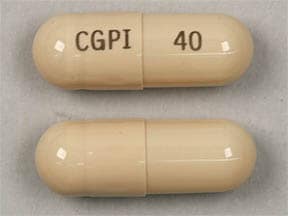Oracea
Generic name: doxycycline
Drug classes: Miscellaneous antimalarials, Tetracyclines
Medically reviewed by A Ras MD.
What is Oracea?
Oracea is a tetracycline-class medicine. Oracea is a prescription medicine used in adults to treat only pimples or bumps (papules and pustules) caused by a condition called rosacea. Oracea does not lessen redness caused by rosacea.
Oracea should not be used for the treatment or prevention of infections.
It is not known if Oracea is:
- effective for use for longer than 16 weeks.
- safe for use longer than 9 months.
- safe and effective in children. Oracea should not be used in infants and children less than 8 years of age because it may cause stained teeth in infants and children.
Description
ORACEA (doxycycline, USP) Capsules 40 mg are hard gelatin capsule shells filled with two types of doxycycline beads (30 mg immediate release and 10 mg delayed release) that together provide a dose of 40 mg of anhydrous doxycycline (C22H24N2O8).
The structural formula of doxycycline, USP is:

with an empirical formula of C22H24N2O8•H2O and a molecular weight of 462.46. The chemical designation for doxycycline is 2-Naphthacenecar-boxamide,4-(dimethylamino)-1,4,4a,5,5a,6,11,12a-octahydro-3,5,10,12,12a-pentahydroxy-6-methyl-1,11-dioxo-, [4S-(4α, 4aα, 5α, 5aα, 6α,12aα)]-, monohydrate. It is very slightly soluble in water.
Inert ingredients in the formulation are: hypromellose, iron oxide red, iron oxide yellow, methacrylic acid copolymer, polyethylene glycol, Polysorbate 80, sugar spheres, talc, titanium dioxide, and triethyl citrate.
Mechanism of Action
The mechanism of action of ORACEA in the treatment of inflammatory lesions of rosacea is unknown.
Who should not take Oracea?
Do not take Oracea if you are allergic to doxycycline or other medicines in the tetracycline-class. Ask your doctor or pharmacist for a list of these medicines if you are not sure.
What should I tell my healthcare provider before taking Oracea?
Before you take Oracea tell your doctor if you:
- have kidney problems.
- have liver problems.
- have diarrhea or watery stools.
- have vision problems.
- have had surgery on your stomach (gastric surgery).
- have or had a yeast or fungal infection in your mouth or vagina.
- have any other medical condition.
- are pregnant or plan to become pregnant. Oracea may harm your unborn baby. Taking Oracea while you are pregnant may cause serious side effects on the growth of bone and teeth of your baby. Stop taking Oracea and call your doctor right away if you become pregnant while taking Oracea.
- are breastfeeding or plan to breastfeed. Oracea can pass into your breast milk and may harm your baby. Talk to your doctor about the best way to feed your baby if you take Oracea. You and your doctor should decide if you will take Oracea or breastfeed. You should not do both.
You should not take Oracea if you are a male with a female sexual partner who plans to become pregnant at any time while you are being treated with Oracea.
Tell your doctor about all of the medicines you take, including prescription and non-prescription medicines, vitamins, and herbal supplements. Oracea and other medicines can affect each other causing serious side effects.
Especially tell your doctor if you take:
- birth control pills. Oracea may reduce the effectiveness of birth control pills. Talk to your doctor about what types of birth control you can use to prevent pregnancy while taking Oracea.
- a blood thinner medicine.
- a penicillin (antibacterial medicine).
- proton pump inhibitors or antacids that contain aluminum, calcium, or magnesium.
- products containing iron or bismuth subsalicylate.
- a medicine taken by mouth that contains isotretinoin or acitretin.
- a medicine to treat seizures, such as carbamazepineor or phenytoin.
Ask your doctor or pharmacist for a full list of these medicines, if you are not sure.
Know the medicines you take. Keep a list of your medicines and show it to your doctor and pharmacist when you get a new medicine.
How should I take Oracea?
- Take Oracea exactly as prescribed by your doctor. Taking more than your prescribed dose may increase your chance of side effects, including the chance that bacteria will become resistant to Oracea.
- Take Oracea 1 time a day in the morning on an empty stomach.
- You should take Oracea at least one hour before or two hours after a meal.
- Take Oracea with enough fluid to completely swallow the capsule and to lower your risk of getting irritation or ulcer in your esophagus. Your esophagus is the tube that connects your mouth to your stomach.
- If you took too much Oracea call your doctor right away.
- Your doctor may do blood tests during treatment with Oracea to check for side effects.
What should I avoid while taking Oracea?
Avoid sunlight or artificial sunlight, such as a tanning booth or sunlamp. You could get severe sunburn. Use sunscreen and wear clothes that cover your skin while out in sunlight.
What are the possible side effects of Oracea?
Oracea may cause serious side effects, including:
- Harm to an unborn baby. See “What should I tell my doctor before taking Oracea?”
- Permanent teeth discoloration. Oracea may permanently turn a baby or child’s teeth yellow-grey-brown during tooth development. Oracea should not be used during tooth development. Tooth development happens in the last half of pregnancy, and from birth to 8 years of age. See “What should I tell my doctor before taking Oracea?”
- Intestine infection (pseudomembranous colitis). Pseudomembranous colitis can happen with most antibiotics, including Oracea. Call your doctor right away if you get diarrhea or bloody stools.
- Immune system reactions including a lupus-like syndrome, hepatitis, and inflammation of blood or lymph vessels (vasculitis). Stop taking Oracea and tell your doctor right away if you get joint pain, fever, rash, or body weakness.
- Discoloration (hyperpigmentation). Oracea can cause darkening of your skin, scars, teeth, gums, nails, and whites of your eyes.
- Benign intracranial hypertension, also called pseudotumor cerebri. This is a condition where there is high pressure in the fluid around the brain. This swelling may lead to vision changes and permanent vision loss. Stop taking Oracea and tell your doctor right away if you have blurred vision, vision loss, or unusual headaches.
These are not all the possible side effects of Oracea. For more information, ask your doctor or pharmacist.The most common side effects of Oracea include:
- soreness in the nose and throat
- sinus infection
- fungus infection
- flu-like symptoms
- diarrhea
- stomach (abdominal) bloating or pain
- high blood pressure (hypertension)
- change in certain blood tests
Tell your doctor if you have any side effect that bothers you or that does not go away.
These are not all the possible side effects of Oracea. For more information, ask your doctor or pharmacist.
Call your doctor for medical advice about side effects. You may report side effects to FDA at 1-800-FDA-1088.
General information about the safe and effective use of Oracea
Medicines are sometimes prescribed for purposes other than those listed in a Patient Information leaflet. Do not take Oracea for a condition for which it was not prescribed. Do not give Oracea to other people, even if they have the same symptoms you have. It may harm them.
This Patient Information leaflet summarizes the most important information about Oracea. If you would like more information, talk with your doctor. You can also ask your doctor or pharmacist for information that is written for health professionals.
How should I store Oracea?
- Store Oracea at room temperature between 59°F to 86°F (15°C to 30°C).
- Keep Oracea in a tightly closed container.
- Keep Oracea inside container and out of light.
Keep Oracea and all medicine out of the reach of children.
What are the ingredients in Oracea?
Active ingredient: doxycycline
Inactive ingredients: hypromellose, iron oxide red, iron oxide yellow, methacrylic acid copolymer, polyethylene glycol, Polysorbate 80, sugar spheres, talc, titanium dioxide, and triethyl citrate.
Label
PACKAGE LABEL
- NDC 0299-3822-30
- Oracea®
- (DOXYCYCLINE, USP) Capsules
- 40 mg*
- *30 mg IMMEDIATE RELEASE &
10 mg DELAYED RELEASE BEADS - 30 CAPSULES
- RX ONLY
- GALDERMA
- Marketed by:
GALDERMA Laboratories, L.P.
Fort Worth, Texas 76177 USAAll trademarks are the property of their respective owners.
oracea.com
P56801-0


SRC: NLM .
